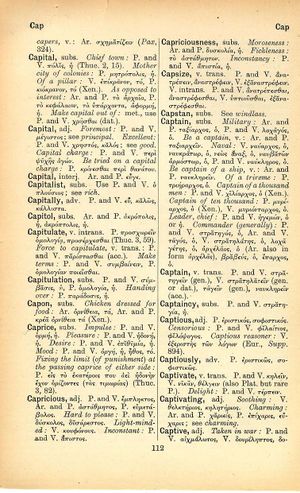capital
λύχνον μεθ᾿ ἡμέραν ἅψας περιῄει λέγων “ἄνθρωπον ζητῶ” → He lit a lamp in broad daylight and said, as he went about, “I am looking for a human”
English > Greek (Woodhouse)
subs.
Chief town: P. and V. πόλις, ἡ (Thuc. 2, 15).
Mother city of colonies: P. μητρόπολις, ἡ.
Of a pillar: V. ἐπίκρανον, τό, P. κιόκρανον, τό (Xen.).
As opposed to interest: Ar.. and P. τὰ ἀρχαῖα, P. το κεφάλαιον, τὰ ὑπάρχοντα, ἀφορμή, ἡ.
Make capital cut of: Met., use P. and V. χρῆσθαι (dat.).
adj.
Foremost: P. and V. μέγιστος; see principal.
Excellent: P. and V. χρηστός, καλός; see good.
Capital charge: P. and V. περὶ ψυχῆς ἀγών.
Be tried on a capital charge: P. κρίνεσθαι περὶ θανάτου.
interj.
Ar. and P. εὖγε.
Latin > English (Lewis & Short)
căpĭtal: v. capitalis.
Latin > French (Gaffiot 2016)
căpĭtăl,¹⁴ ālis, n. (capitalis),
1 crime capital : capital facere Pl. Merc. 611, commettre un crime capital ; capitalia vindicare Cic. Leg. 3, 6, punir les crimes capitaux || capital est avec inf., c’est un crime capital de : Liv. 24, 37, 9 ; Sen. Ben. 4, 38, 2 ; Curt. 8, 9, 34 ; Plin. 12, 63 ; 18, 12 ; [formules de lois] : si servus... fecerit, ei capital (esto) Dig. 47, 21, 3, 1, si un esclave a fait..., que ce soit pour lui un crime capital ( Cic. Inv. 2, 96 ) ; qui non paruerit, capital esto Cic. Leg. 2, 21, pour qui n’aura pas obéi, crime capital || căpĭtāle Tac. Agr. 2 ; Quint. 9, 2, 67 au lieu de capital
2 bandeau des prêtresses dans les sacrifices : Varro L. 5, 130 ; P. Fest. 57, 6.

